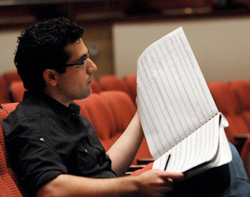by Daniel Hathaway

I caught the Thursday morning performance at Fairmount Temple Auditorium, which got off to a bit of a late start waiting for school buses to arrive. When everybody was in place, the audience was as intergenerational as one could expect at 10:00 am: students, their teachers and aides and a number of older attendees — people whose commitments and schedules allow them to come to a true “matinee.”
Miller was a kid-friendly emcee who greeted the young audience warmly and avoided talking down to them as he introduced the Rossini overture. CityMusic, informally attired and looking a bit crowded on the stage of the auditorium, played La gazza ladra with spirit and precision even though curtains soaked up a lot of their sound (and the dull acoustics of the hall didn’t help).
Avner Dorman (pictured above), who composed Uzu and Muzu on commission from the Stockton (CA) Symphony, was on hand to narrate his piece, which had its premiere a year ago March. Dorman discovered Sidon’s book when he was twelve and had long thought of setting it to music. He explains the point of the fable: “This is a story about feuds within families that no one remembers what they’re about, it is about quarrels within a nation, it is about prejudice against foreigners, and it is about the senselessness of war.”
Dorman decided to musically represent the two brothers from Kakaruzu, Uzu and Muzu, who fall out over the cosmic issue of how one should properly cross his legs, with two percussionists who play mallets and a whole battery of other instruments, colorfully demonstrated beforehand by Fujii and Rinderknecht. As the tale unfolded and the feud led to the building of a wall and the extension of the conflict many generations into the future, the soloists and orchestra expertly realized Dorman’s colorful musical representations of cooperation, conflict and reconciliation — and along the way simulated some humorous everyday sounds like snoring. The busy percussion soloists were outstanding.
The audience hung on every word and note of the story and score, which was a charming and evocative grab bag of musical styles and near-quotations. Only a couple of rows of very young children — probably too young to be engaged by this rather sophisticated tale and score — babbled among themselves throughout the piece.
CityMusic’s Executive Director Eugenia Strauss, clipboard in hand, turned into a bus dispatcher at the end of the hour-long program. Running an orchestra can be a complicated enterprise!
Published on ClevelandClassical.com April 26, 2013
Click here for a printable version of this article.


